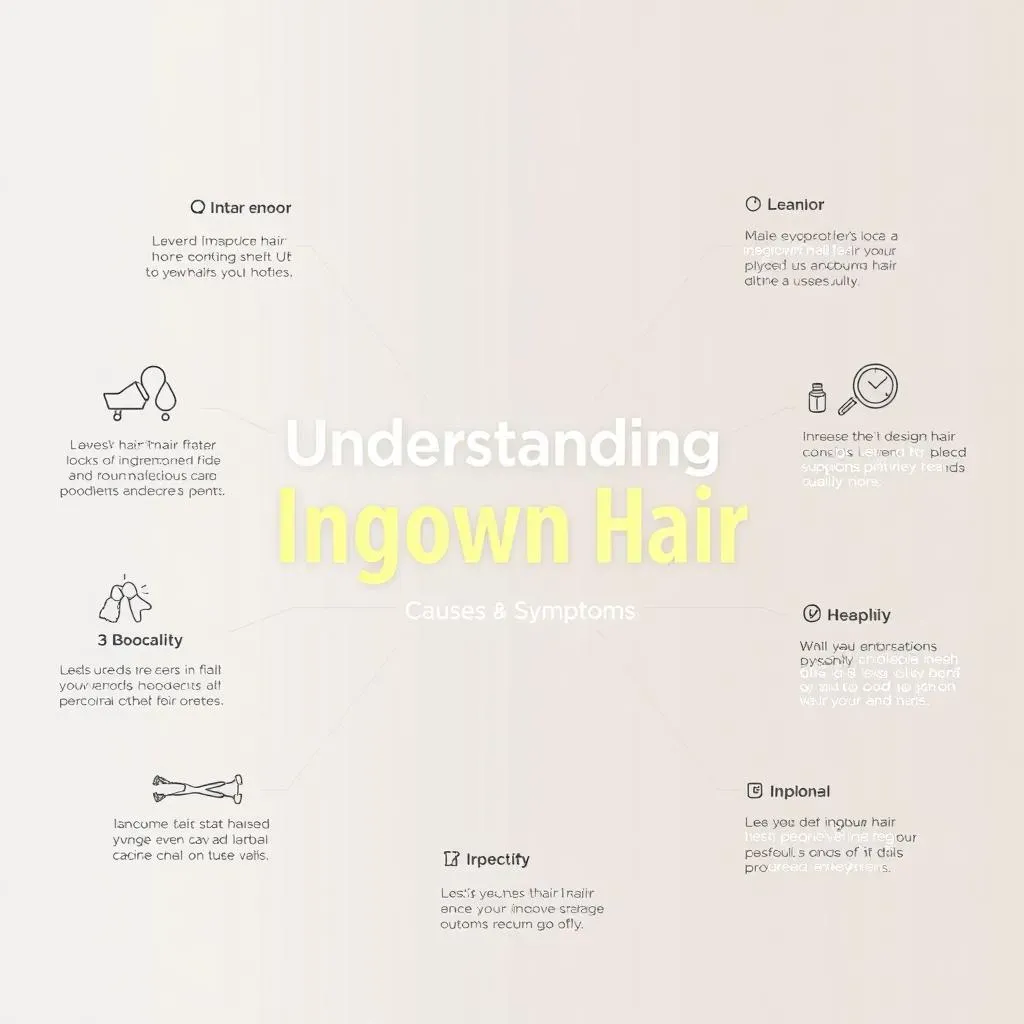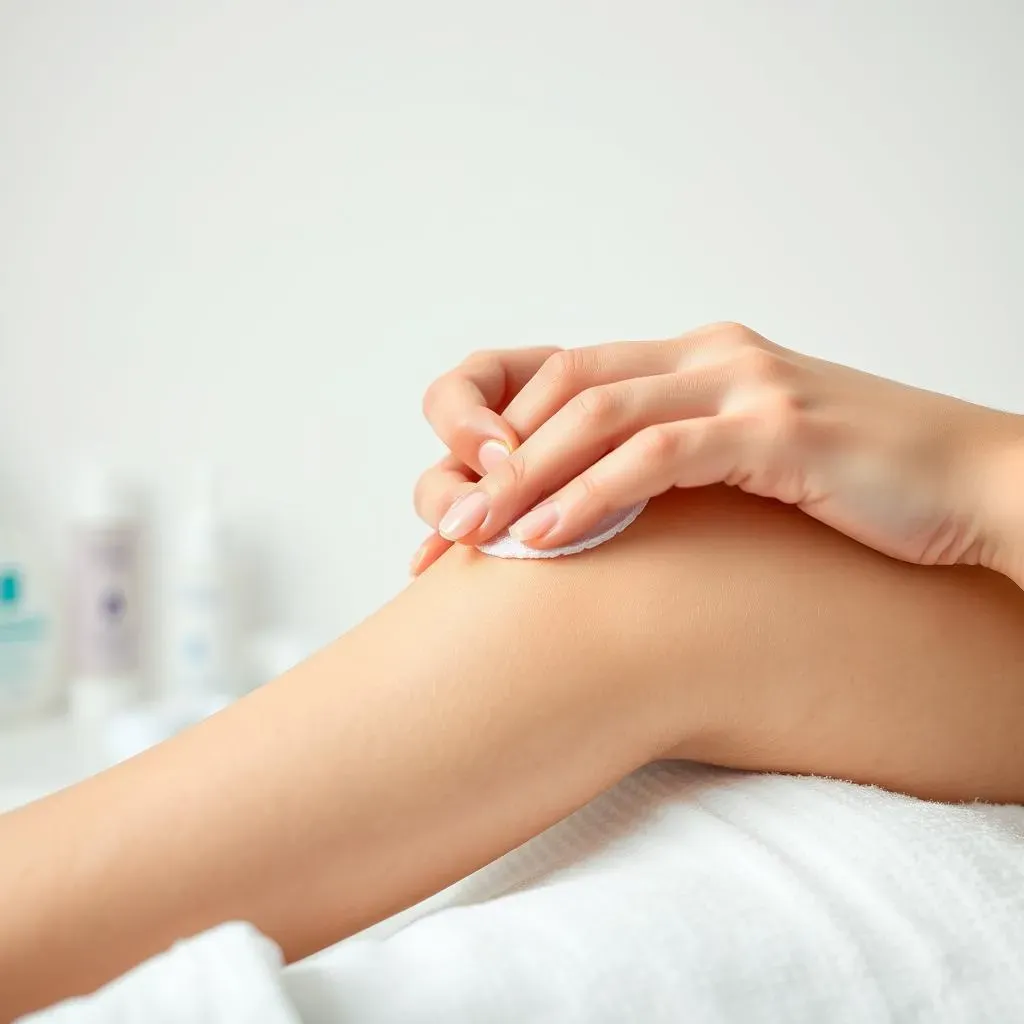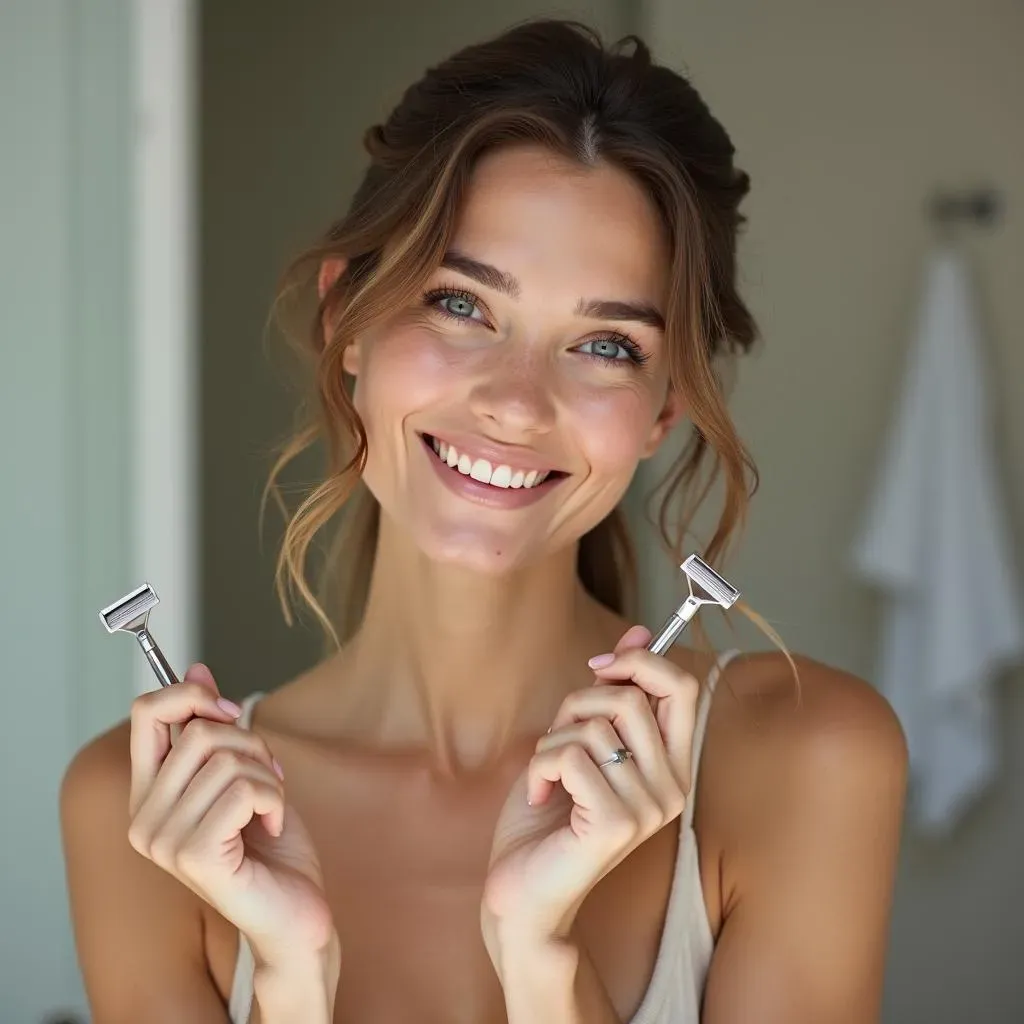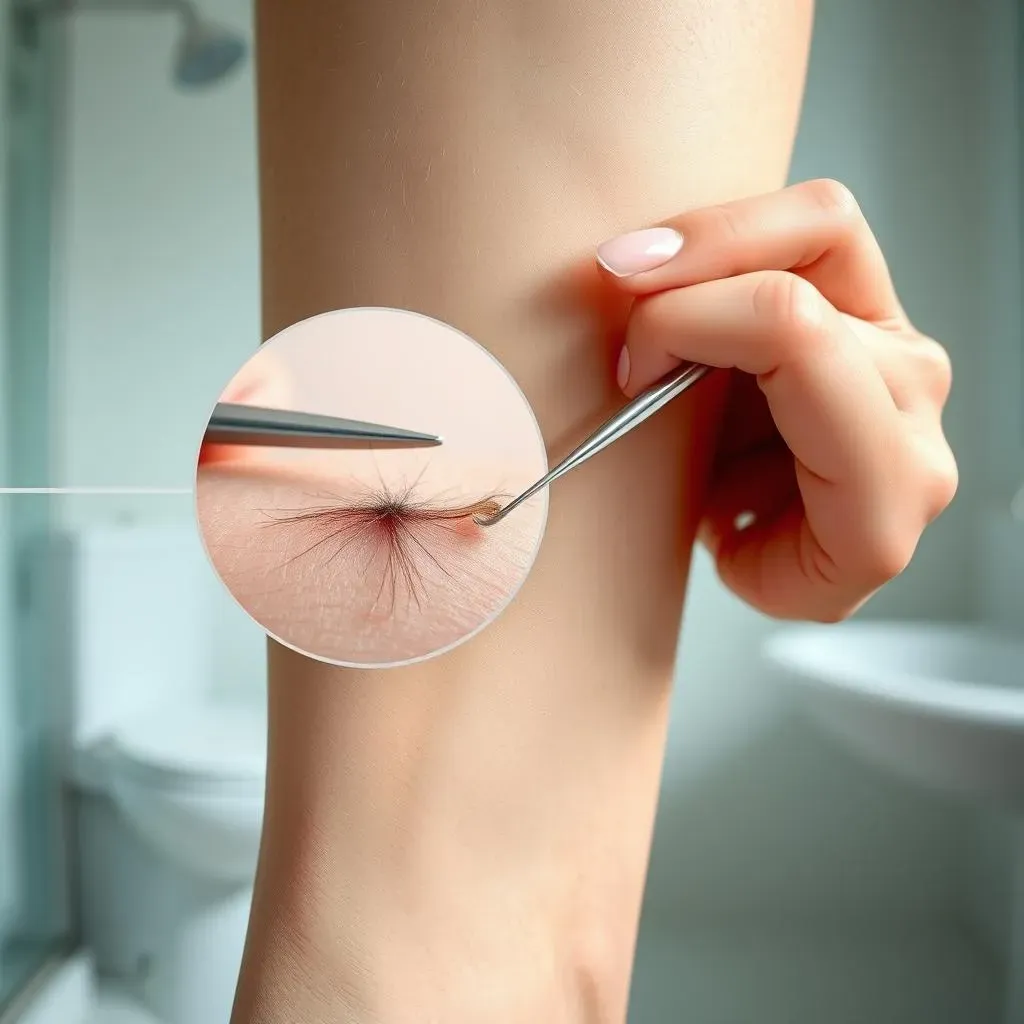Table of Contents
Ingrown hairs can be a frustrating and painful problem for many individuals, especially those with curly or coarse hair. Removing ingrown hair is crucial to prevent infection, scarring, and promoting healthy skin. If you're struggling with ingrown hairs, you're not alone. This article will guide you through the causes and symptoms of ingrown hairs, as well as provide effective methods for removing ingrown hair. From home remedies to advanced techniques like laser hair removal at Hairawaybylaser.com, we'll cover it all. Whether you're looking to treat existing ingrown hairs or prevent future occurrences, this comprehensive guide will equip you with the knowledge and tools you need to achieve smooth, healthy skin. So, let's dive into the world of ingrown hair removal and explore the best ways to tackle this common issue.
Understanding Ingrown Hair: Causes and Symptoms

Understanding Ingrown Hair: Causes and Symptoms
Ingrown hairs occur when a strand of hair grows back into the skin, rather than outward, resulting in inflammation, redness, and sometimes infection. This condition can affect anyone, but it's more common in individuals with curly or coarse hair. Ingrown hairs often appear on the face, legs, armpits, and pubic area, where hair removal is frequent.
The symptoms of ingrown hair can vary from person to person but typically include skin irritation, small bumps or papules, pain, discoloration, and itching. In severe cases, ingrown hairs can lead to infection, which may require medical attention. It's essential to recognize the signs of ingrown hairs to take prompt action and prevent complications.
Common Symptoms | Description |
|---|---|
Skin Irritation | Redness, swelling, and inflammation around the affected area |
Small Bumps or Papules | Raised, often painful bumps on the skin where the ingrown hair is located |
Pain | Tenderness or sharp pain when touching the affected area |
Discoloration | Dark spots or hyperpigmentation resulting from ingrown hairs |
Itching | Intense itching sensation around the ingrown hair |
Ingrown hairs can be caused by various factors, including improper shaving techniques, tight clothing, and poor skin care routines. Understanding these causes is crucial for effective prevention and treatment. By recognizing the symptoms and addressing the root causes, individuals can take the first steps towards removing ingrown hair and maintaining healthy, smooth skin.
- Improper shaving techniques, such as shaving too closely or against the grain
- Tight clothing that causes friction and irritation
- Poor skin care routines, including inadequate exfoliation and moisturizing
- Genetic predisposition, as individuals with curly or coarse hair are more prone to ingrown hairs
Removing Ingrown Hair: Treatment Options and Home Remedies

Removing Ingrown Hair: Treatment Options and Home Remedies
Home Remedies for Ingrown Hair Removal
When it comes to removing ingrown hair, there are several home remedies that can be effective in promoting healing and preventing infection. One of the most recommended methods is applying a warm compress to the affected area. Soaking the skin in warm water for 10-15 minutes can help open up the pores, allowing the ingrown hair to release more easily. Additionally, using depilatory products can dissolve the protein structures of the hair, making it easier to remove.
Exfoliating the skin is also crucial in removing dead skin cells and helping the ingrown hair reach the surface. Using a gentle exfoliating scrub or a chemical exfoliant containing alpha-hydroxy acids (AHAs) or beta-hydroxy acids (BHAs) can help break down the keratin protein that traps the hair. Furthermore, applying topical creams or ointments containing ingredients like hydrocortisone or tea tree oil can reduce inflammation and prevent infection.
Remedy | Description | Benefits |
|---|---|---|
Warm Compress | Applying a warm, damp cloth to the affected area | Opens pores, encourages hair to release |
Depilatory Products | Dissolves hair protein for easy removal | Reduces need for shaving, waxing, or tweezing |
Exfoliation | Removes dead skin cells, promotes hair release | Improves skin texture, reduces ingrown hair recurrence |
Topical Creams/Ointments | Reduces inflammation, prevents infection | Soothes skin, promotes healing |
- Avoid tight clothing that may irritate the skin
- Keep the affected area clean and moisturized
- Avoid picking or scratching the ingrown hair, as this can lead to infection
Medical Treatment Options for Ingrown Hair
In cases where ingrown hairs are severe or persistent, medical treatment may be necessary. A doctor can diagnose ingrown hairs through a physical examination and may prescribe medications to treat any underlying infections. Topical antibiotics or steroid creams can be used to reduce inflammation and prevent infection. In some cases, a doctor may use a sterile needle to gently tease out the ingrown hair, bringing it to the surface of the skin for easier removal.
For individuals with recurring ingrown hairs, laser hair removal can be an effective solution. This procedure uses a laser to target and destroy hair follicles, reducing the likelihood of ingrown hairs. Laser hair removal can be performed on most areas of the body and is a popular option for those who want a more permanent solution to ingrown hair removal.
Treatment | Description | Benefits |
|---|---|---|
Topical Antibiotics | Treats bacterial infections | Reduces inflammation, prevents infection |
Steroid Creams | Reduces inflammation and swelling | Promotes healing, reduces scarring |
Laser Hair Removal | Permanently reduces hair growth | Minimizes ingrown hair risk, provides smooth skin |
Preventing Ingrown Hair: Tips for Healthy Hair Removal

Preventing Ingrown Hair: Tips for Healthy Hair Removal
Proper Hair Removal Techniques
Preventing ingrown hairs starts with proper hair removal techniques. When shaving, it's essential to shave in the direction of hair growth, not against it. Using a single-blade razor can also help reduce the risk of ingrown hairs, as multi-blade razors can cause hair to be cut too short, leading to ingrown hairs. Exfoliating the skin before shaving can help remove dead skin cells and allow for a closer shave.
Another effective method for preventing ingrown hairs is to use depilatory products, which dissolve the protein structures of hair, making it easier to remove without shaving. Waxing is another option, but it's crucial to follow proper waxing techniques to avoid causing ingrown hairs. Tweezing should be done sparingly, as it can cause hair to break off below the skin's surface, leading to ingrown hairs.
Hair Removal Method | Description | Benefits |
|---|---|---|
Shaving with a Single-Blade Razor | Shaves in the direction of hair growth | Reduces ingrown hairs, promotes healthy skin |
Depilatory Products | Dissolves hair protein for easy removal | Minimizes risk of ingrown hairs, reduces shaving frequency |
Waxing | Removes hair from the root | Long-lasting results, smooth skin |
Tweezing | Removes individual hairs | Temporary solution, should be used sparingly |
Good Skin Care Routines
Good skin care routines are essential for preventing ingrown hairs. Exfoliating regularly can help remove dead skin cells and prevent them from accumulating and trapping hair. Using a gentle exfoliating scrub or a chemical exfoliant containing alpha-hydroxy acids (AHAs) or beta-hydroxy acids (BHAs) can promote cell turnover and improve skin texture.
Moisturizing is also crucial, as it helps to keep the skin hydrated and supple. Avoiding tight clothing can reduce friction and irritation, which can contribute to ingrown hairs. By combining these tips, individuals can reduce their risk of developing ingrown hairs and maintain healthy, smooth skin.
- Exfoliate regularly to remove dead skin cells
- Moisturize to keep skin hydrated and supple
- Avoid tight clothing to reduce friction and irritation
- Avoid shaving over the same spot multiple times
- Consider laser hair removal for a more permanent solution
Advanced Ingrown Hair Removal Techniques: Laser Hair Removal at Hairawaybylaser.com

Advanced Ingrown Hair Removal Techniques: Laser Hair Removal at Hairawaybylaser.com
For individuals who suffer from frequent ingrown hairs, laser hair removal can be a game-changer. This advanced technique uses a laser to target and destroy hair follicles, significantly reducing the growth of new hair and minimizing the risk of ingrown hairs. At Hairawaybylaser.com, state-of-the-art laser technology is used to provide safe and effective hair removal solutions.
The process begins with a consultation to determine the best course of treatment. A trained professional will assess the area to be treated and discuss any concerns or questions you may have. During the procedure, the laser emits a beam of light that is absorbed by the pigment in the hair follicle, damaging it and preventing future growth. The treatment is relatively painless, with some patients describing a mild stinging sensation.
Benefits of Laser Hair Removal | Description | Results |
|---|---|---|
Permanent Hair Reduction | Significantly reduces hair growth | Smoother skin, fewer ingrown hairs |
Minimizes Ingrown Hairs | Reduces the risk of ingrown hairs | Healthier skin, reduced inflammation |
Convenience | Long-lasting results, reduces need for frequent shaving or waxing | Saves time, reduces skin irritation |
Laser hair removal is a popular choice for those who want a more permanent solution to ingrown hairs. By targeting the root cause of the problem, individuals can enjoy smoother, healthier skin with minimal maintenance. Whether you're looking to treat ingrown hairs on the face, legs, or pubic area, Hairawaybylaser.com offers personalized laser hair removal treatments to suit your needs.
- Book a consultation to determine the best course of treatment
- Prepare for the procedure by avoiding sun exposure and removing makeup
- Attend follow-up sessions to achieve optimal results
Don't let ingrown hairs hold you back any longer. With laser hair removal at Hairawaybylaser.com, you can say goodbye to painful ingrown hairs and hello to smooth, radiant skin. Take the first step towards a hair-free, worry-free you.
Conclusion: Achieving Smooth Skin with Effective Ingrown Hair Removal
Removing ingrown hair requires a combination of proper hair removal techniques, good skin care routines, and effective treatment options. By understanding the causes and symptoms of ingrown hairs, you can take the necessary steps to prevent them from occurring in the first place. For those struggling with severe or persistent ingrown hairs, advanced techniques like laser hair removal can provide a long-term solution. Remember, smooth and healthy skin is within reach. With the right approach to removing ingrown hair, you can say goodbye to the discomfort and embarrassment of ingrown hairs and enjoy the confidence that comes with radiant, healthy-looking skin. Whether you choose to use home remedies or seek professional help, the key to success lies in consistency and patience. Start your journey to ingrown hair-free skin today!
